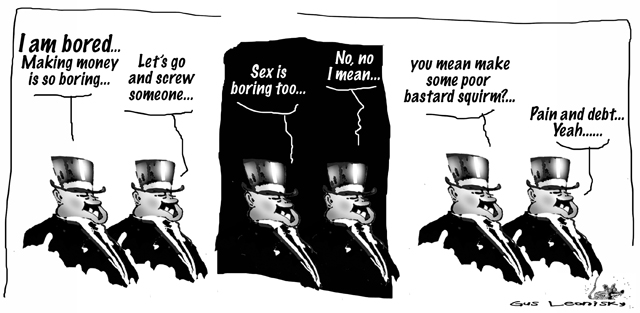Search
Recent comments
- struth....
6 hours 48 min ago - earth....
7 hours 29 min ago - sordid....
7 hours 52 min ago - distraction....
8 hours 9 min ago - F word....
9 hours 12 min ago - not losing....
14 hours 24 min ago - herzog BS....
14 hours 47 min ago - freedom to say.....
17 hours 42 min ago - wanton barbarism....
1 day 6 hours ago - little nazi....
1 day 8 hours ago
Democracy Links
Member's Off-site Blogs
the conservative mind...

Late in life, William F. Buckley made a confession to Corey Robin. Capitalism is "boring," said the founding father of the American right. "Devoting your life to it," as conservatives do, "is horrifying if only because it's so repetitious. It's like sex." With this unlikely conversation began Robin's decade-long foray into the conservative mind. What is conservatism, and what's truly at stake for its proponents? If capitalism bores them, what excites them?
----------------------
The Mirage of a Classless Society
read more: http://www.theamericanconservative.com/articles/the-mirage-of-a-classless-society/
In his analysis, Goldman miss the point made by Krugman:
…modern liberalism is in some sense the obverse — it is about creating a society that is more fluid as well as fairer. We all like to laugh at the war-on-Christmas types, right-wing blowhards who fulminate about the liberal plot to destroy family values. We like to point out that a country like France, with maternity leave, aid to new mothers, and more, is a lot more family-friendly than rat-race America. But if “family values” actually means traditional structures of authority, then there’s a grain of truth in the accusation. Both social insurance and civil rights are solvents that dissolve some of the restraints that hold people in place, be they unhappy workers or unhappy spouses. And that’s part of why people like me support them.
Gus: The argument here proposed by Krugman is not that of non-hierarchical society but that of fluid society in which people can move about, on merit, not on who they sleep with or whom their friends are. nor by doing "favours", nor by inheritance of birth. It is also a society where the hierarchy does not exploit the bottom rungs but help improve their station, thus the "hierarchy" is there to serve the people rather the present reverse.
as Goldman points out:
The conservative position has never been simply that a hierarchical society is better than an egalitarian one. It’s that an egalitarian society is impossible. Every society includes rulers and ruled. The central question of politics, therefore, is not whether some will command while others obey. It’s who gives the orders.
Impossible? humbug... But it's not about who gives the orders. It is about the quality and social inspiration of the orders. More to come but in the meantime:
I note that :
ENA was Created by General de Gaulle in October 1945, the founding principles of the Ecole nationale d’administration are to broaden access to the highest executive levels of government service, and to provide professional training for senior civil servants.
Hence, the school’s principal responsibility is to recruit and train the men and women who will make public service a living institution and enable it to adapt to ever-changing times. At the same time, the school must pass on the ethics of government service to its graduates, based on the values of responsibility, political neutrality and selfless service.
Gus: of all the dictators ever to tread on this planet, General de Gaulle was the most egalitarian.
- By Gus Leonisky at 16 Apr 2015 - 8:28am
- Gus Leonisky's blog
- Login or register to post comments
confetti, money and femen...
A young woman interrupted a news conference by European Central Bank president Mario Draghi by charging at him, jumping on his desk, showering him in confetti and calling for an "end to the ECB dictatorship".
The woman, wearing a T-shirt with the same slogan but spelt "dick tatorship", flashed a V for victory sign and smiled as two men in suits bundled her out of the bank's new Frankfurt headquarters holding her arms and legs.
After the brief interruption, Mr Draghi returned to the podium to continue the news conference.
read more: http://www.abc.net.au/news/2015-04-16/protester-ecb-mario-draghi-news-conference-confetti/6396090
undermining democracy with cash...
A profound sense of cognitive dissonance lies at the center of American politics: one that even our most elite journalists and pundits refuse to recognize. In virtually all of our political debate and news coverage, the competition between the two parties is treated as one of personalities and ideas. As with any democracy, the guys who are the most popular, whether for reasons of charisma or appealing policy proposals, emerge as the winners. The job of journalists and pundits is to illuminate the candidates’ character and beliefs and track their respective successes, dividing themselves between “substance” and “horse-race” coverage however they see fit.
But this is nonsense. In fact, American political life revolves around two mutually reinforcing truths. The first is that our democracy has been severely corrupted by money; the second is that the conservative movement, and hence the Republican Party, is dominated by ideological extremists who demonstrate zero interest in the problems of actual governance. Taken together, these truths not only define our political debate; they ensure that virtually nothing is decided on its merits—up to and including our national elections.
Catch a bigfoot journalist or pundit at a social event or private gathering, and he or she will likely admit these truths. Scan the editorials and opinion pages of most major newspapers, and you’ll see the power of money decried on a fairly regular basis. But in the news stories, where it matters most, even our best reporters feel the need to put forth a fairy-tale narrative in which the United States enjoys a fully functioning democracy and our elections and laws accurately represent the genuine will of the people.
read more: http://www.thenation.com/article/205713/why-do-political-reporters-refuse-show-us-money